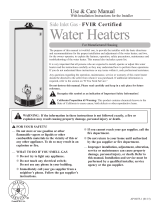
Internet Version For Reference Only
Installation (Water Connections) continued-
water faucets to allow air to escape from the water system. When a steady
stream of water flows through the faucets, close them and check all water
connections for possible leaks. NEVER OPERATE THE WATER HEATER
WITHOUT FIRST BEING CERTAIN IT IS FILLED WITH WATER.
WARNING
For protection against excessive temperatures and pressure, install
temperature and pressure protective equipment required by local codes,
but not less than a combination temperature and pressure relief valve
certified by a nationally recognized testing laboratory that maintains
periodic inspection of production of listed equipment or materials as
meeting the requirements of the Standard for Relief Valves and Automatic
Gas Shutoff Devices for Hot Water Supply Systems, ANSI Z21.22 or the
Standard CAN1-4.4. Temperature and Pressure and the Standard CAN1-
4.4, Temperature, Pressure, Temperature and Pressure Relief Valves and
Vacuum Relief Valves. The combination temperature and pressure relief
valve shall be marked with a maximum set pressure not to exceed the
maximum working pressure of the water heater. The combination
temperature and pressure relief valve shall also have an hourly rated
temperature steam BTU discharge capacity not less than the hourly rating
of the water heater.
Install the combination temperature and pressure relief valve into the
opening provided and marked for this purpose on the water heater.
Note: Some models may already be equipped or supplied with a
combination temperature and pressure relief valve. Verify that the
combination temperature and pressure relief valve complies with local
codes. If the combination temperature and pressure relief valve does not
comply with local codes, replace it with one that does. Follow the
installation instructions above on this page.
Install a discharge line so that water discharged from the combination
temperature and pressure relief valve will exit within six (6) inches (15.2
cm) above, or any distance below the structural floor and cannot contact
any live electrical part. The discharge line is to be installed to allow for
complete drainage of both the combination temperature and pressure relief
valve and the discharge line. The discharge opening must not be subjected
to blockage or freezing. DO NOT thread, plug or cap the discharge line. It
is recommended that a minimum clearance of four (4) inches (10.2 cm) be
provided on the side of the water heater for servicing and maintenance of
the combination temperature and pressure relief valve.
Do not place a valve between the combination temperature and pressure
relief valve and the tank.
13




















